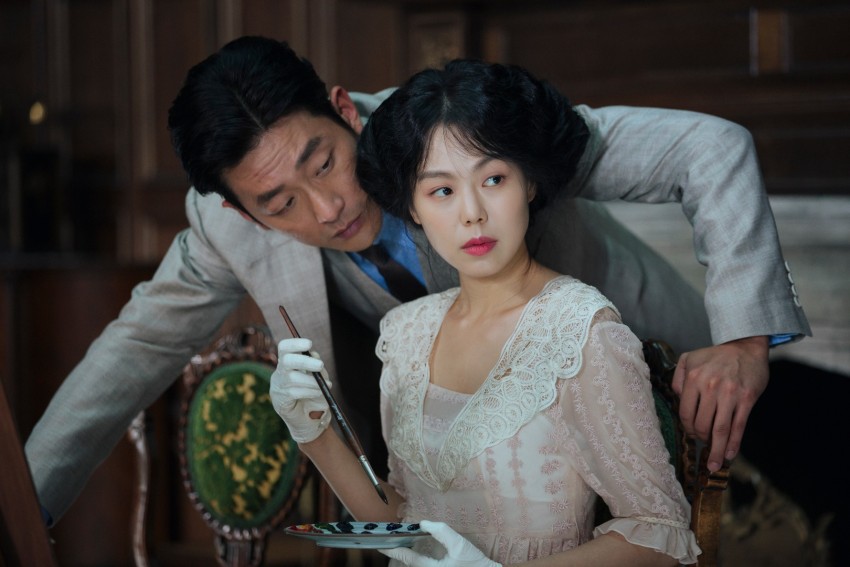The Handmaiden
April 12, 2017 · 0 comments
by Jeremy Clarke.
 Weighing in at a lengthy two and a half hours, this lavish, sexually-explicit, South Korean pot-boiler is based on Sarah Waters’ 2002 novel Fingersmith, but moves the location from Victorian England to Japanese colonial-era Korea.
Weighing in at a lengthy two and a half hours, this lavish, sexually-explicit, South Korean pot-boiler is based on Sarah Waters’ 2002 novel Fingersmith, but moves the location from Victorian England to Japanese colonial-era Korea.
Waters’ tale concerns a conman’s plot to marry and then defraud a wealthy English heiress by confining her to an asylum. He bribes a young London pickpocket (the titular ‘fingersmith’) to take on a job as the wealthy lady’s maid, hoping to get her to persuade the woman to marry him. However, his plan falls apart when the two women fall for each other.
When director Park Chan-wook discovered the BBC had already made a 2005 miniseries, he transposed the plot to 1930s Korea (a Japanese colony at the time), co-writing his script with regular female collaborator Jeong Seo-kyeong. Broadly speaking, it substitutes well-off Japanese for well-off English, and Koreans for everyone else. The print being released in UK cinemas helpfully subtitles Japanese dialogue in yellow and Korean dialogue in white.
In practice, the heiress and her mother are the sole Japanese characters. Her uncle is Korean, pretending to be Japanese, while the native household staff has been given new Japanese names for the duration of their employment. Although the Koreans are having a hard time under Japanese rule, it’s as if they still aspire to be as Japanese as their overlords.
 Part One introduces us to the main characters. A car chauffeurs childless young Korean woman Okyu (Kim Tae-ri) through picturesque scenery to a house on a vast estate. On arrival, she is assigned the Japanese name Tamako by the housekeeper Miss Sasaki (Kim Hae-suk) and is shown her sleeping quarters next to the bedroom of the Lady Hideko (Kim Min-hee). But, almost immediately, Okyu/Tamako reveals in a flashback voice-over that her real name is Sookee and that she was raised as a pickpocket alongside other orphans under the care of a criminal matriarch. She has been recruited by suave conman Count Fujiwara (Ha Jung-woo) to work as Hideko’s maid and convince her to marry him. He plans to put his new wife in a madhouse so as to usurp her fortune.
Part One introduces us to the main characters. A car chauffeurs childless young Korean woman Okyu (Kim Tae-ri) through picturesque scenery to a house on a vast estate. On arrival, she is assigned the Japanese name Tamako by the housekeeper Miss Sasaki (Kim Hae-suk) and is shown her sleeping quarters next to the bedroom of the Lady Hideko (Kim Min-hee). But, almost immediately, Okyu/Tamako reveals in a flashback voice-over that her real name is Sookee and that she was raised as a pickpocket alongside other orphans under the care of a criminal matriarch. She has been recruited by suave conman Count Fujiwara (Ha Jung-woo) to work as Hideko’s maid and convince her to marry him. He plans to put his new wife in a madhouse so as to usurp her fortune.
In much the same way that this disclosure calls into question the information initially presented to the audience in the opening scenes, later plot revelations disrupt other early assumptions. Part Two switches narrator from Sookee to Hideko, leaping back to her childhood and schooling by her uncle Kouzuki (Jo Jin-woong) and aunt (Moon So-ri). Her uncle also holds invitation-only book readings for select groups of male friends to whom her aunt reads aloud. Much of this narrative information has already been floating around on the fringes of Part One in the distance in Sookee’s point-of-view shots or in dialogue exchanges.
However the film’s tone shifts considerably in Part Two with the revelation that Uncle Kouzuki’s book collection entirely comprises Japanese erotica. We are shown a number of illustrations of this, one of the first being Hokusai’s tentacular Dream of The Fisherman’s Wife (1814), which is echoed later in the film by an actual octopus crawling out of a fish tank. Part Three is the part which least resembles Waters’ book. It feels closer in substance to the sort of revenge drama one has come to expect from Park Chan-wook, typified by his best-known film Oldboy (2003).
The revelation over the library transforms the uncle in the audience’s eyes – no longer a batty, old, bookish gent, he is now a pimp and a pander. But just as the literary erotica in the film is employed for the gratification of a male audience, so are its sex scenes. An early sequence involves Sookee’s filing down a jagged tooth inside Hideko’s mouth while the latter sits in the bath. Latent eroticism switches to full-blown audience voyeurism with a cut to a lovingly lit, lingering shot of Hideko’s breasts filling the screen. Subsequent sex scenes between the two women feel less like an exploration of their character than an excuse to portray girl-on-girl action for further titillation. The effect is to undermine the believability of the two female characters – a pity because the web of deception is compelling enough on its own terms, complete with compelling revelations as new plot elements change the implications of earlier scenes.
The Handmaiden is released in the UK and Ireland on 14th April 2017.
Leave a Reply